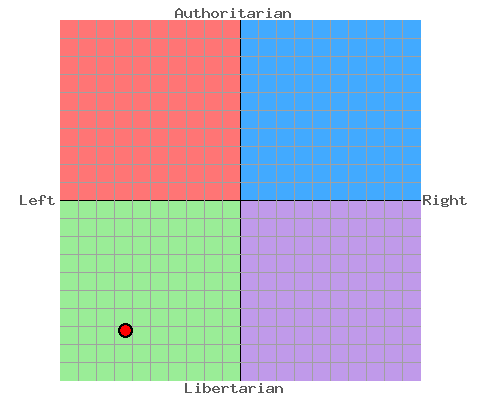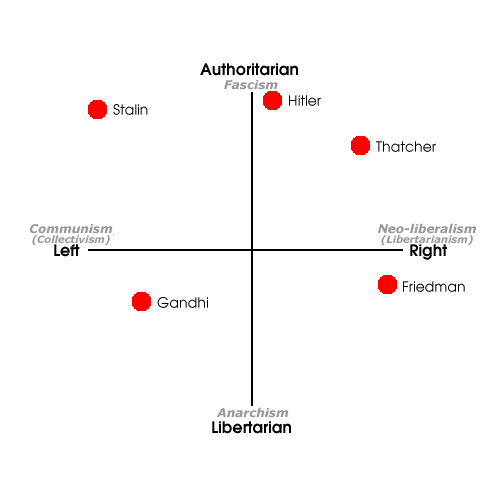(As for my clinical teaching posts, school closed today and Wednesday for inclement weather. Which is not the same thing as increment weather.)
RawStory discusses the nascent “progressive libertarian” alliance foreseen by trends analysts. I like the idea of such a movement. If you have no clue where you fall in poly-sci pidgeonhole terminology, take this handy-dandy, overly simplistic, but quite awesome quiz at PoliticalCompass.org. Here’s the scale:
And my result:

Again, via PoliticalCompass.org
So: I’m as left as the Ghandi dot on economics, but more in favor of individual choice in social spheres — the anti-rules vibe. (I know little about Ghandi, which is why I say his dot rather than him.) Sounds like a ‘progressive libertarian’ to me.
Unfortunately two self-appointed loudmouths for the ‘progressive libertarian’ concept, Ralph Nader and Ron Paul, are problems — Nader handed Bush II the presidency by running as a self-aggrandizing third party candidate, and even if Paul didn’t name his son after Ayn Rand, her philosophy suits both of them.
Anyway. People commonly define libertarians as rightwing on economic issues and leftwing on social ones; lately, libertarians seem to be realizing more and more that corporations and secret interests interfere with the laissez-faire capitalism they want. Republicans wrongly describe themselves as laissez-faire, when they’re actually pro-big-biz; libertarians, in contrast, though they’re pro-capitalism, don’t want governments to give favors to businesses any more than they want regulations on biz. (I think leftist commentators inaccurately blur Republicans and libertarians, missing this distinction.) I don’t want to whitewash the libertarian infrastructure, though; some of their organizations are run by billionaires rather than what I’m talking more about: the pontificating college kid in your coffee shop or whatever.
Progressives are left on both economic and social issues. They share the libertarians’ anti-corporatism (neither are going to oppose your small business), they share the libertarians’ anti-corruption, anti-secrecy, and often anti-military streaks. Progressives differ in that they want to expand the public sector to fund nonprofitable stuff the market won’t incentivize, as well as goods and services that work better when they’re considered common goods — welfare, health care payment, roads, parks, etc.
But both are anti-corruption, both favor we-the-people deciding through honest and educated democracy, both want to figure out in a transparent manner which policies will govern well. Many of them inhabit a data-driven milieu that differs from the (worthy) help-the-downtrodden phrasings of past movements. That’s partly why I think you have folks such as Jimmy Wales and Julian Assange describing themselves as libertarians. (Though Assange said he knows human nature and history well enough to understand profit-minded business has to be forced to play fair.) On the other side of the “progressive libertarian” phrase, progressive, you have kos running polls and visitor statistics constantly.

Pic via Eric Raymond
The budding “progressive libertarian” alliance seems to fit with the ever-increasing number of geeks who by digital-native default hate censorship, admire Pirate Parties and Wikileaks, go to the mat for civil liberties, and constitute a good share of young activists. I realize the progressive libertarian concept isn’t entirely new in de facto terms — see the “leftist libertarian” in this political cartoon — but still, even though the trends analyst mentioned by RawStory beat me to it, I’d still like to say “called it” six or so years from now when “progressive libertarian” becomes a very vocal bloc.
For tomorrow I plan to post about politics on a more face-to-face, individual and small group level (it takes a dern village!) based on a comment I left on Glenn Greenwald’s blog. There’s also, in my future plans, a post about how political positions can relate to family governing styles.

 Twitter:
Twitter:
Join the conversation